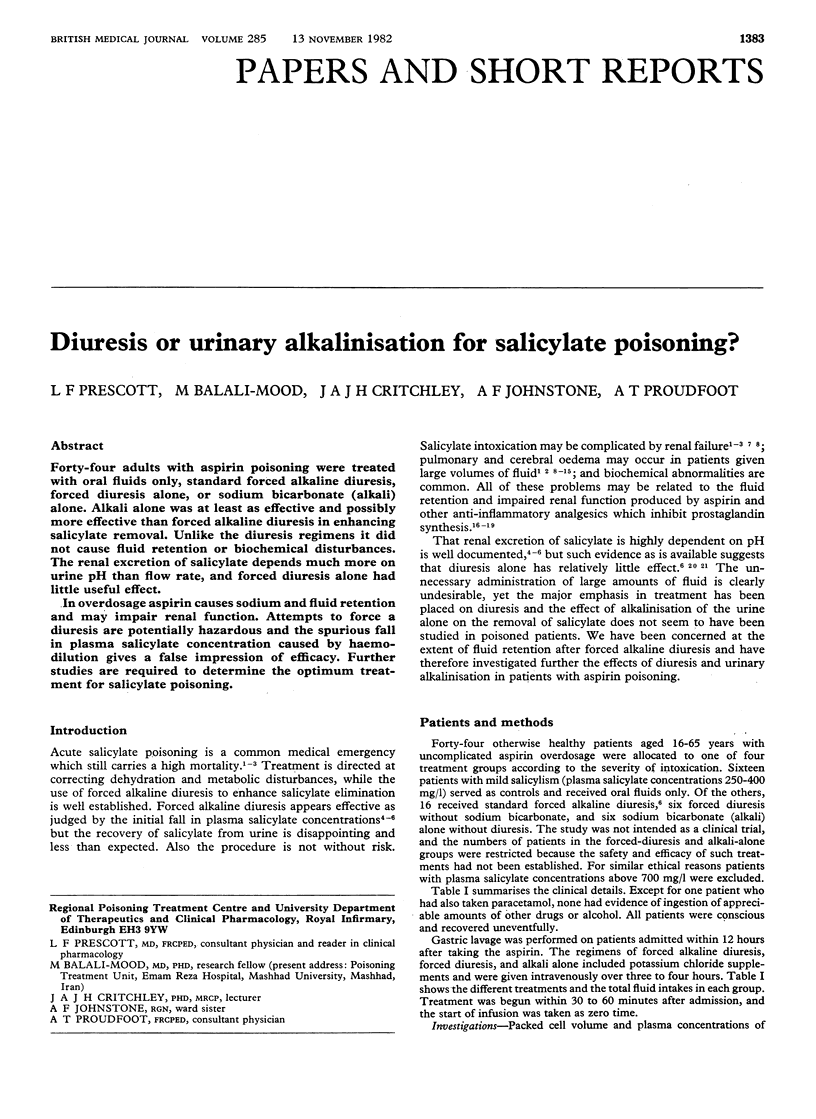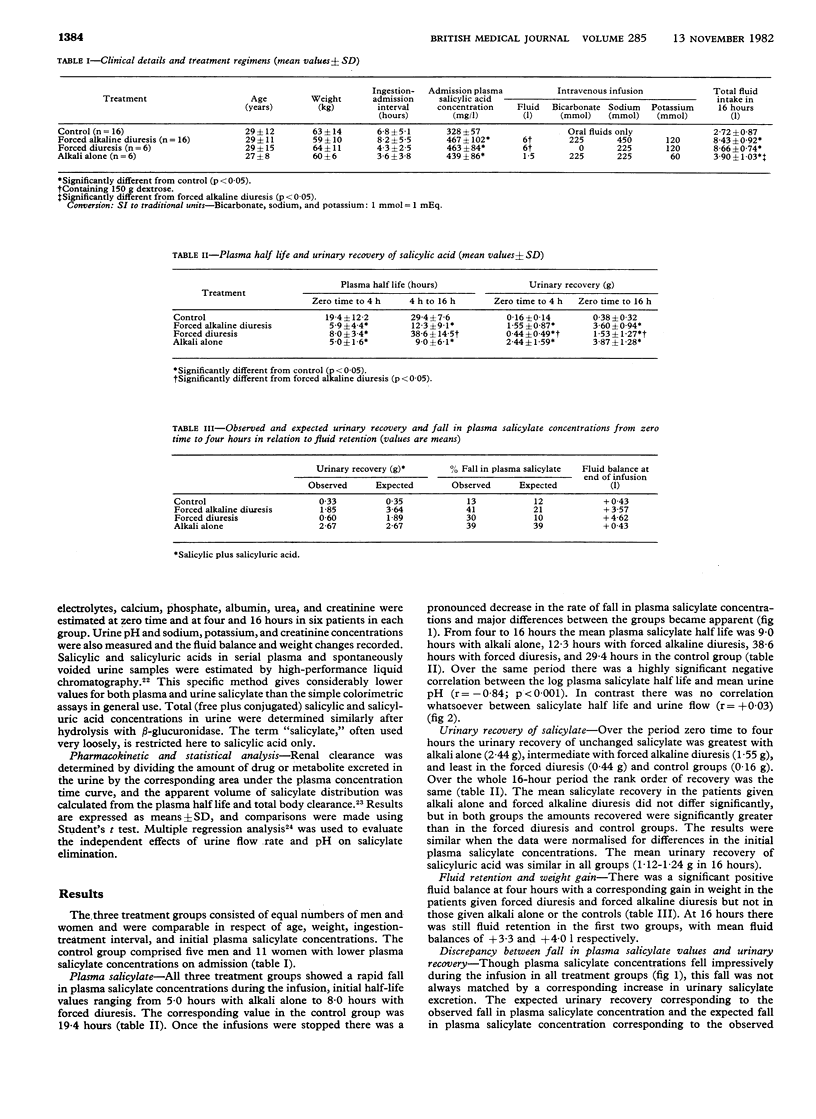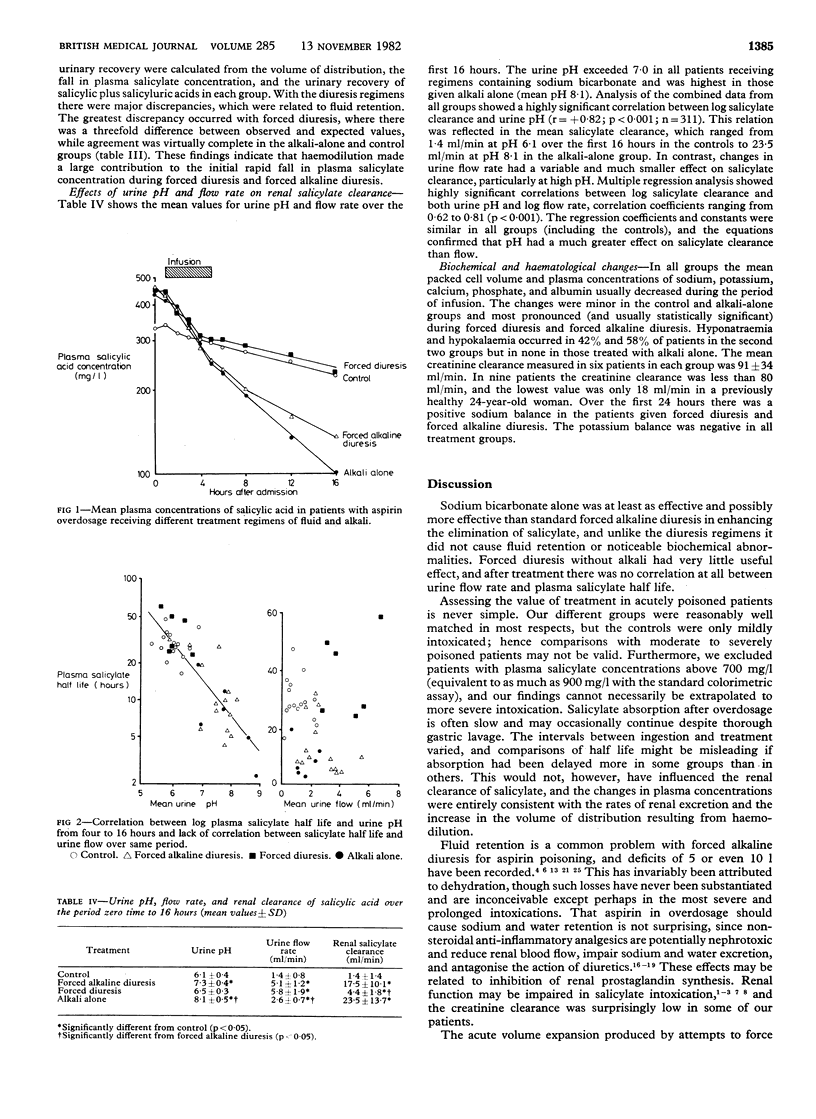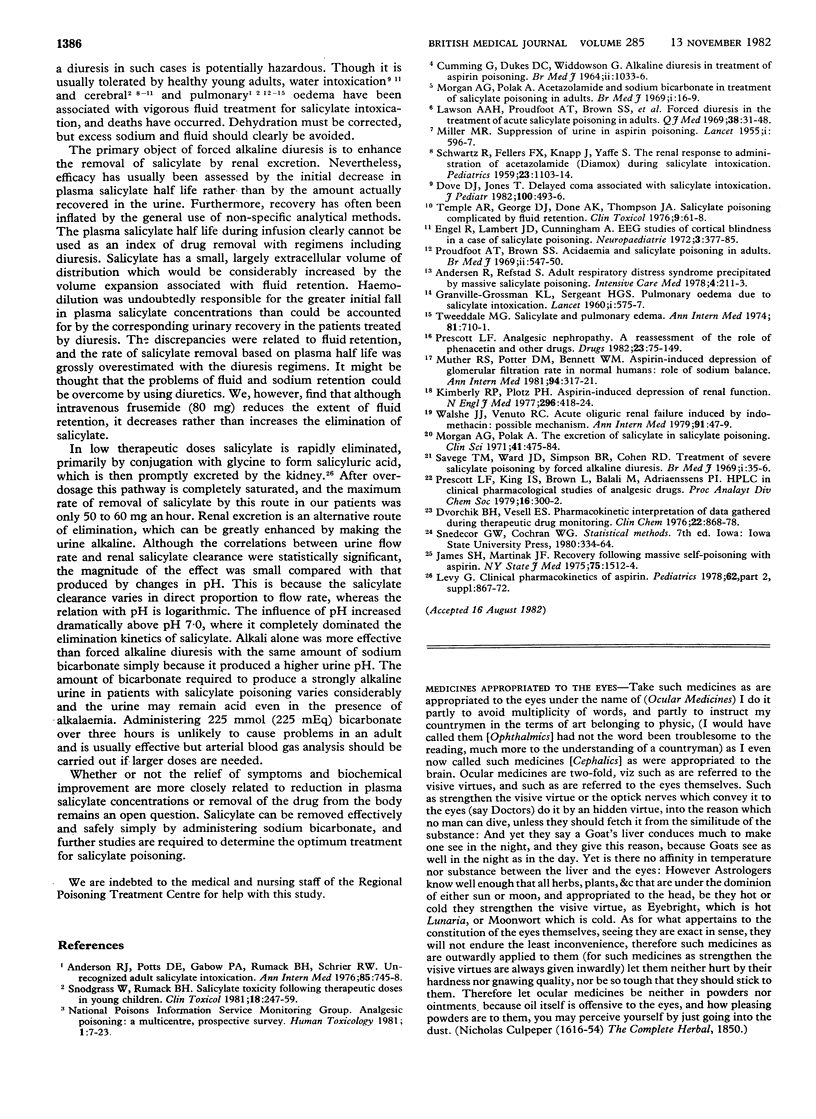Abstract
Forty-four adults with aspirin poisoning were treated with oral fluids only, standard forced alkaline diuresis, forced diuresis alone, or sodium bicarbonate (alkali) alone. Alkali alone was at least as effective and possibly more effective than forced alkaline diuresis in enhancing salicylate removal. Unlike the diuresis regimens it did not cause fluid retention or biochemical disturbances. The renal excretion of salicylate depends much more on urine pH than flow rate, and forced diuresis alone had little useful effect. In overdosage aspirin causes sodium and fluid retention and may impair renal function. Attempts to force a diuresis are potentially hazardous and the spurious fall in plasma salicylate concentration caused by haemodilution gives a false impression of efficacy. Further studies are required to determine the optimum treatment for salicylate poisoning.
Full text
PDF



Selected References
These references are in PubMed. This may not be the complete list of references from this article.
- Andersen R., Refstad S. Adult respiratory distress syndrome precipitated by massive salicylate poisoning. Intensive Care Med. 1978 Nov;4(4):211–213. doi: 10.1007/BF01902550. [DOI] [PubMed] [Google Scholar]
- Anderson R. J., Potts D. E., Gabow P. A., Rumack B. H., Schrier R. W. Unrecognized adult salicylate intoxication. Ann Intern Med. 1976 Dec;85(6):745–748. doi: 10.7326/0003-4819-85-6-745. [DOI] [PubMed] [Google Scholar]
- CUMMING G., DUKES D. C., WIDDOWSON G. ALKALINE DIURESIS IN TREATMENT OF ASPIRIN POISONING. Br Med J. 1964 Oct 24;2(5416):1033–1036. doi: 10.1136/bmj.2.5416.1033. [DOI] [PMC free article] [PubMed] [Google Scholar]
- Dove D. J., Jones T. Delayed coma associated with salicylate intoxication. J Pediatr. 1982 Mar;100(3):493–496. doi: 10.1016/s0022-3476(82)80468-x. [DOI] [PubMed] [Google Scholar]
- Dvorchik B. H., Vesell E. S. Pharmacokinetic interpretation of data gathered during therapeutic drug monitoring. Clin Chem. 1976 Jun;22(6):868–878. [PubMed] [Google Scholar]
- GRANVILLE-GROSSMAN K. L., SERGEANT H. G. Pulmonary oedema due to salicylate intoxication. Lancet. 1960 Mar 12;1(7124):575–577. doi: 10.1016/s0140-6736(60)92781-1. [DOI] [PubMed] [Google Scholar]
- James S. H., Martinak J. F. Recovery following massive self-poisoning with aspirin. N Y State J Med. 1975 Aug;75(9):1512–1514. [PubMed] [Google Scholar]
- Kimberly R. P., Plotz P. H. Aspirin-induced depression of renal function. N Engl J Med. 1977 Feb 24;296(8):418–424. doi: 10.1056/NEJM197702242960803. [DOI] [PubMed] [Google Scholar]
- Lawson A. A., Proudfoot A. T., Brown S. S., MacDonald R. H., Fraser A. G., Cameron J. C., Matthew H. Forced diuresis in the treatment of acute salicylate poisoning in adults. Q J Med. 1969 Jan;38(149):31–48. [PubMed] [Google Scholar]
- MILLER M. R. Suppression of urine in aspirin poisoning. Lancet. 1955 Mar 19;268(6864):596–597. doi: 10.1016/s0140-6736(55)91642-1. [DOI] [PubMed] [Google Scholar]
- Morgan A. G., Polak A. The excretion of salicylate in salicylate poisoning. Clin Sci. 1971 Nov;41(5):475–484. doi: 10.1042/cs0410475. [DOI] [PubMed] [Google Scholar]
- Muther R. S., Potter D. M., Bennett W. M. Aspirin-induced depression of glomerular filtration rate in normal humans: role of sodium balance. Ann Intern Med. 1981 Mar;94(3):317–321. doi: 10.7326/0003-4819-94-3-317. [DOI] [PubMed] [Google Scholar]
- Prescott L. F. Analgesic nephropathy: a reassessment of the role of phenacetin and other analgesics. Drugs. 1982 Jan-Feb;23(1-2):75–149. doi: 10.2165/00003495-198223010-00004. [DOI] [PubMed] [Google Scholar]
- Proudfoot A. T., Brown S. S. Acidaemia and salicylate poisoning in adults. Br Med J. 1969 May 31;2(5656):547–550. doi: 10.1136/bmj.2.5656.547. [DOI] [PMC free article] [PubMed] [Google Scholar]
- SCHWARTZ R., FELLERS F. X., KNAPP J., YAFFE S. The renal response to administration of acetazolamide (diamox) during salicylate intoxication. Pediatrics. 1959 Jun;23(6):1103–1114. [PubMed] [Google Scholar]
- Savege T. M., Ward J. D., Simpson B. R., Cohen R. D. Treatment of severe salicylate poisoning by forced alkaline diuresis. Br Med J. 1969 Jan 4;1(5635):35–36. doi: 10.1136/bmj.1.5635.35. [DOI] [PMC free article] [PubMed] [Google Scholar]
- Snodgrass W., Rumack B. H., Peterson R. G., Holbrook M. L. Salicylate toxicity following therapeutic doses in young children. Clin Toxicol. 1981 Mar;18(3):247–259. doi: 10.3109/15563658108990033. [DOI] [PubMed] [Google Scholar]
- Temple A. R., George D. J., Done A. K., Thompson J. A. Salicylate poisoning complicated by fluid retention. Clin Toxicol. 1976;9(1):61–68. doi: 10.3109/15563657608995407. [DOI] [PubMed] [Google Scholar]
- Tweeddale M. G. Letter: Salicylate and pulmonary edema. Ann Intern Med. 1974 Nov;81(5):710–711. doi: 10.7326/0003-4819-81-5-710_2. [DOI] [PubMed] [Google Scholar]
- Walshe J. J., Venuto R. C. Acute oliguric renal failure induced by indomethacin: possible mechanism. Ann Intern Med. 1979 Jul;91(1):47–49. doi: 10.7326/0003-4819-91-1-47. [DOI] [PubMed] [Google Scholar]


